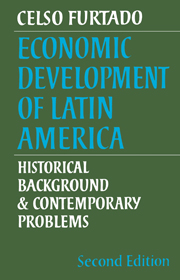Book contents
- Frontmatter
- Contents
- Tables
- Preface to the second edition
- Preface to the first edition
- Abbreviations
- Maps
- PART ONE FROM THE CONQUEST TO THE FORMATION OF NATION-STATES
- 1 Introduction: the land and the people
- 2 Economic and social background of the territorial occupation
- 3 First half of the nineteenth century
- PART TWO ENTRY INTO THE SYSTEM OF INTERNATIONAL DIVISION OF LABOUR
- PART THREE THE TRADITIONAL STRUCTURAL PATTERN
- PART FOUR CHARACTERISTICS OF THE INDUSTRIALISATION PROCESS
- PART FIVE REORIENTATION OF DEVELOPMENT IN THE RECENT PERIOD
- PART SIX INTERNATIONAL RELATIONS
- PART SEVEN INTRA-REGIONAL RELATIONS
- PART EIGHT STRUCTURAL RECONSTRUCTION POLICIES
- Bibliography
- Index
3 - First half of the nineteenth century
Published online by Cambridge University Press: 25 January 2010
- Frontmatter
- Contents
- Tables
- Preface to the second edition
- Preface to the first edition
- Abbreviations
- Maps
- PART ONE FROM THE CONQUEST TO THE FORMATION OF NATION-STATES
- 1 Introduction: the land and the people
- 2 Economic and social background of the territorial occupation
- 3 First half of the nineteenth century
- PART TWO ENTRY INTO THE SYSTEM OF INTERNATIONAL DIVISION OF LABOUR
- PART THREE THE TRADITIONAL STRUCTURAL PATTERN
- PART FOUR CHARACTERISTICS OF THE INDUSTRIALISATION PROCESS
- PART FIVE REORIENTATION OF DEVELOPMENT IN THE RECENT PERIOD
- PART SIX INTERNATIONAL RELATIONS
- PART SEVEN INTRA-REGIONAL RELATIONS
- PART EIGHT STRUCTURAL RECONSTRUCTION POLICIES
- Bibliography
- Index
Summary
End of the colonial era
The break-up of the Spanish and Portuguese Empires at the time of the Napoleonic Wars was the last act in the complex historical process that unfolded throughout the eighteenth century, and was intimately related to the economic and social changes that had taken place in Europe. Spain's attempts to diversify the economies of her American colonies encountered two major obstacles: the protectionist barriers erected in the principal European markets as a result of prevailing mercantilist policies and her own inability to supply the colonies with manufactured goods. The colonies sought a way out of this situation by trying to find direct markets (through the contraband trade) or by producing domestically the articles they needed. Both attempts involved direct conflict with the metropolis. In regions with a developed export agriculture, such as Venezuela, or with a flourishing trade, such as Buenos Aires, awareness of these problems had crystallised very early under the influx of liberal ideas from England and France. With the outbreak of the Napoleonic Wars, Spain's isolation and the rapid penetration of British commercial interests precipitated changes difficult to reverse after the establishment of autonomous local authorities in various regions. In most cases, these governments arose in circumstances which did not involve hostility to the metropolis, then occupied by the French. But the very dynamic of the process led to breakaway movements, which in some cases took the form of prolonged and cruel struggle against the obstinate attempts of the Spaniards to restore a situation which had long ceased to exist.
- Type
- Chapter
- Information
- Economic Development of Latin AmericaHistorical Background and Contemporary Problems, pp. 34 - 41Publisher: Cambridge University PressPrint publication year: 1977



